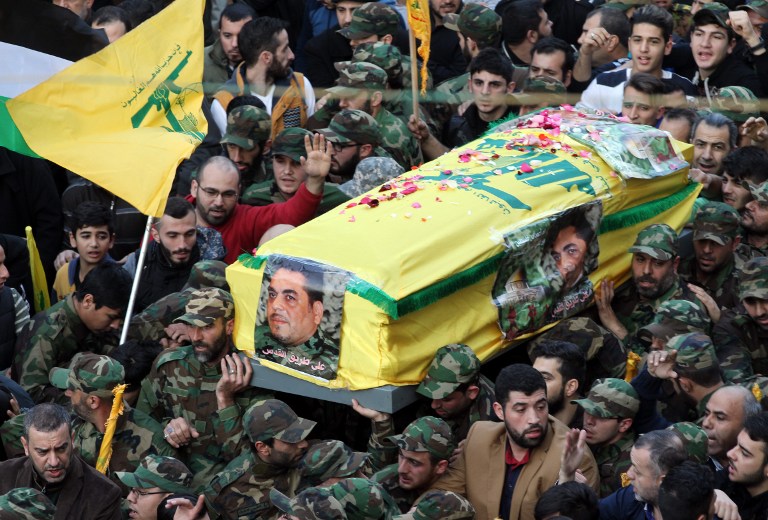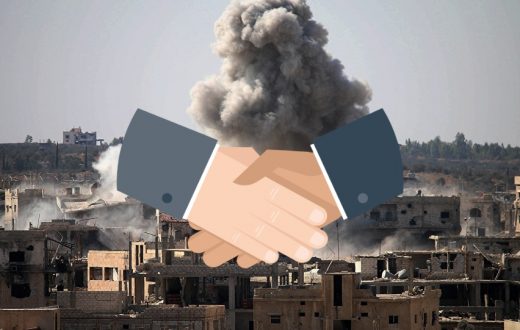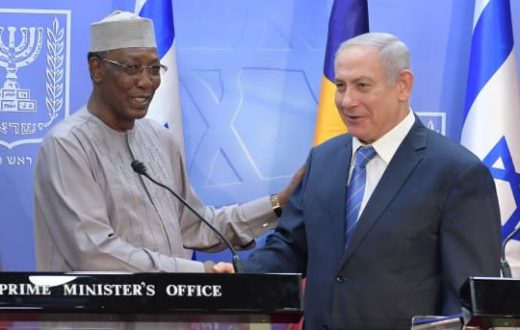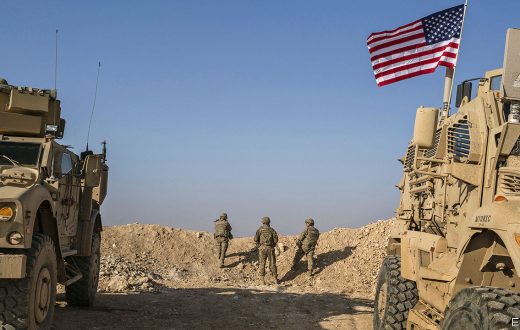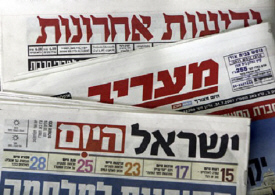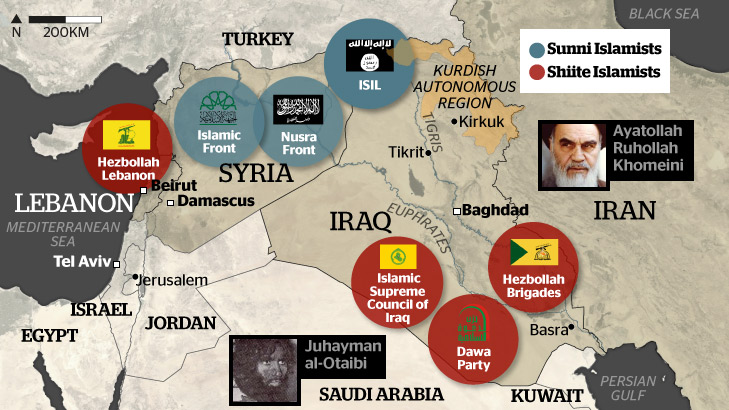In Damascus , the cold night of December 19th was not any different from the others nights in Damascus. The streets were full of people and cars despite recurrent electricity blackouts. The coffees were full of clients , despite the civil war and large groups of foreign journalist were staying at the Sheraton Hotel. Few blocks away, Samir Kuntar , a terrorist that killed a whole family in Israel in the 80s , and has since became a Lebanese commander of “The Syrian resistance for the liberation of occupied Golan” was at his residence in the suburb of Ja’aramana in the eastern part of Damascus.
At 22:42 p.m., Twitter account “Damascus Now” tweeted: “Several mortars exploded in the city of Jaramana injuring several people.” This was to be normal, too, if it wasn’t for the fact that what was thought to be mortars were missiles that destroyed the building and killed three men.
Most of the local resident know that Kuntar lived in that building according to local sources.
A local journalist declared for local newspapers: “They found the body, told the family, and it’s now all about Hezbollah’s statement in the morning.” At 4:18 a.m., Bassam Kuntar, Samir’s younger brother, tweeted the news: “With honor, we mourn Cmdr. Samir Kuntar and we proudly join the cavalcade of the martyrs’ families.”
Samir Kuntar knew that Israel wanted to retaliate against him, and as a consequence knew his days were counted. He even declared to the Pan-Arab news network Al-Mayedeen few months before that “The most important thing is that even if Israel assassinated me, the path of resistance in Syria started and nobody can stop it.”
Kuntar discussed the issue with close friends and raised it with his leaders in Hezbollah.
“The Israeli threats on martyr Kuntar’s life existed from the day he was released, even before the issue of the popular resistance in the Golan Heights was discussed,” Hezbollah’s Secretary-General Hassan Nasrallah said in a speech on Dec. 21, mourning the man whom he described as “one of us,” and vowing revenge. “It’s our right to seek revenge and we will practice this right — let this be known to everyone,” Nasrallah declared
Hassan Nasrallah, the spiritual leader of the Chiite movement Hezbollah spoke in a relatively calm manner, in comparison with its other speeches were he call to destroy the “Zionist Entity”. He declared: “There’s no doubt that Israel carried out the assassination. It was a roaring military operation, not a silent ambiguous intelligence attack,” he continued: . “I’ll repeat what I said in January 2015: Whenever any cadre from the Islamic resistance is killed, we will hold Israel responsible and we will respond.”
Hezbollah has been engaged in a paralled war on different fronts with Israel, the newest one being the Golan front , which he referred to in his speech. The assassination of Kuntar seems to be part of this parallel war.
But Hezbollah which is also engaged against Sunnis rebels in Syria, is also facing large opposition among the Sunnis in Lebanon and also in Syria. These recent months, Hezbollah Strongholds in Beirut have been the theaters of various suicide attacks , that targeted clearly Shiites. These attacks were not carried out by Israel but by Sunnis Rebels, from Al-Nusra and ISIS.
Kuntar, according to an Israeli and Iranians, had been working on building the “Syrian resistance for the liberation of occupied Golan” since May 2013. That means he was clearly planning attack against Israelis in the Golan.
Thath is the main reasons why Kuntar was sent by Hezbollah to Syria. There he started to work on old plans to create a new front on the Golan that will makes the headlines in the newspapers. He was supposed to continue the legacy of the former Hezbollah military commander Imad Mughniyeh , that was killed in a targeted killing by Israel in February 2008.
According to our Israeli sources: Kuntar worked on building cells from residents of areas close to the borders with the Golan Heights. He worked on providing them with training, arms and salaries”. His group was getting bigger; his first local officer was called Moafak Badriyeh, a Syrian from the village of Hadar from the liberated part of the Golan Heights. Badriyeh was later killed by Israel. He was responsible for launching rockets at Israeli posts in the occupied Golan Heights and bomb attacks.”
In March 2014, three major incidents took place in the Israeli-occupied part of the Golan Heights: an attack on March 5, March 14 and March 18. The last attack saw one Israeli soldier killed and seven wounded, while four were injured during the second attack.
On April 26, four Syrian fighters were killed during a clash with an Israeli patrol in the Golan Heights. A statement issued that afternoon by the popular Syrian resistance read: “Four Syrian resistance heroes were killed Sunday evening, April 26, 2015. Two from Hadar — Youssef Hassoun and Samih Badriyeh — and two sons of the martyr prisoner Walid Mahmoud from Majdal Shams, Nazih and Thaer Mahmoud.”
An Iranian military source told Al-Monitor that efforts to build the Syrian resistance was a main task executed by Kuntar in coordination with Hezbollah and under the direct supervision of Iran’s Quds Force commander Maj. Gen. Qasem Soleimani and Nasrallah.
“This was an ambitious strategic project for the resistance bloc, and Kuntar played an important role in making it happen. He was assassinated by Israel and he already planned his own revenge,” the source said.
In January 2015, five Hezbollah members and an Iranian high-ranked official were killed in the Golan Heights near Quneitra, when the Israeli Army launched an air-attack on their position. The Israeli Defense forces eliminated in the strikes very important Hezbollah’ leaders Jihad Mughniyeh, the son of Hezbollah’s slain commander Mughniyeh, and Mohammed Issa, who is said to be the Hezbollah commander responsible for the Golan front.
On Sep. 8, the US State Department designated Kuntar as a “specially designated global terrorist.” According to a statement published on its website, Kuntar “played an operational role, with the assistance of Iran and Syria, in building up Hezbollah’s terrorist infrastructure in the Golan Heights.
All the attention is now concentrated on the next Nasrallah’s speech to see if Hezbollah is willing to respond and how. Hezbollah did not rule out to use legal options, but military retaliations, particularly rocket launching on Northern Israel seems more realistic. Nasrallah previously said that he would fore sure respond. The real question is how and where will he respond, because now Hezbollah has the possibility to strike Israel from two different locations: From South Lebanon, where most of its rocket Arsenal is based , and from Syrian Golan Heights , were he can strikes virtually any Israeli Targets, since the rocket-defense (Iron-Dome battery) of Israel on this region is weaker than on the Lebanese border.

